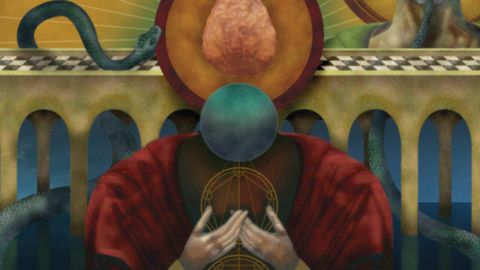F Scott Fitzgerald claimed there were no second acts in American lives.
Thank the gods of prog, then, that The Enid are as English as a 60s LSD party in Grantchester Meadows. Robert John Godfrey and band’s renaissance has been nothing less than miraculous. After their first flowering in the 70s and 80s, many possibly thought The Enid were spent. Yet, the band have produced not just a late blooming, but – as signalled by 2012’s Invicta – a revival of quite startling proportions.
It’s time everyone worshipped at the temple of The Enid.
The Enid have become a complete prog band, retaining the symphonic brilliance of their early work but combining it with a new sense of theatre. This has been accomplished by placing the human voice at the centre. While Godfrey remains the presiding master, the addition of golden-throated freshman Joe Payne has been a revelation. Payne’s vocal range and control have set the other musicians in The Enid free to play and invent.
So, to The Bridge. Intended as the first of two new Enid offerings for 2015, it’s a bridge in several senses. Firstly it rewires the band’s past (it contains several reworkings of older songs) with the present. Most significantly, it offers a bridge between the classical gifts of Godfrey and the rock theatre of the new Enid. Critics are notorious for hyperbole, but The Bridge is simply exquisite. From the opening Erik Satie-like keys of Earthborn through to the closing splendour of Autumn, The Bridge (as the poet has it) stoops heaven to earth.
Yet if reworkings such Earthborn (a song few male voices could convincingly deliver) and My Gravity are majestic, the thrill comes from the entirely new work. Til We’re Old is an elegantly simple piano lied in which Godfrey’s careful arrangement showcases Payne’s mid range. In contrast, Bad Men takes the bonkers interplay of the best of Invicta to a new level. Here Payne’s vocal pyrotechnics joust with the keys and orchestration. Think Freddie Mercury having a musical death-match with Rachmaninoff. Yet, it all holds together brilliantly, the clever flashes of guitar from Jason Ducker acting as a kind of prog glue. If Wings is pure romantic class – perhaps something to entertain the diners at the next Prog awards? – Max Read deserves mention for First Light, a lullaby shaped around layered voices.
Symphonic prog has perhaps never been as cool as it should be. However, when Payne sings ‘We’ll wake the sunrise, we’ll bring the dawn’, it’s possible to believe The Enid are bringing a new dawn for the genre. One thing’s clear: it’s time everyone went and worshipped at the temple of The Enid.

